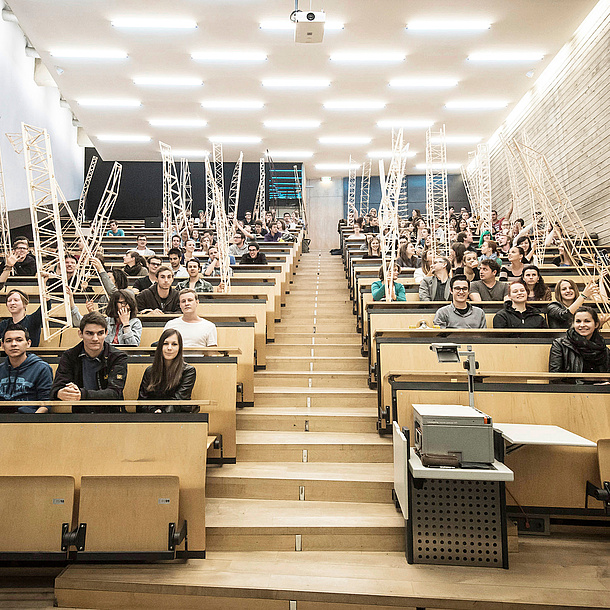Are you creative? Do you enjoy imagining how space can be used? Do you want to combine your sense of aesthetics with technology?
In the Bachelor's Degree Programme Architecture, you will gain comprehensive and applied specialised knowledge that will enable you not only to design objects and spaces, but also to design cities of the future.
Quick Facts
- Duration of study: 6 semesters
- ECTS credit points: 180
- Academic degree: Bachelor of Science (BSc)
- Language of instruction: German
The Bachelor's Programme
In the Bachelor's Degree Programme Architecture, you learn how to design living spaces. Four essential topics are introduced:
- Designing and drafting as a complex, creative process: You will acquire the ability to answer any kind of question architecturally.
- An understanding for and knowledge of constructive, material and technical principles: You will learn how to turn designs into reality.
- Knowledge of architectural history and theory: You will draw on this as a source of inspiration.
- Comprehensive presentation methods: These help you to capture your ideas on paper in a way that everyone can understand.
Students are encouraged to consider the practical relevance of their education in the degree programme. This is supported by teachers who contribute their professional experience to the teaching and by lecture series, such as the “Graz Architecture Lectures”, in which attempts are made to present the broad field of architectural possibilities and topics on an international level. In addition, visiting professors regularly present current developments in architecture.
In this degree programme, you will have the opportunity to apply your projects practically. An excellent infrastructure is available for this purpose, which includes 3D printers, robots, CNC milling machines and other digital devices. This infrastructure enables you to review and present design ideas. As an additional special feature, a furniture construction workshop is available in which students can create their own furniture designs under the guidance of trained carpenters. During your studies, you will also benefit from an excellent mentoring relationship and exciting excursions.
Studying Architecture
Focus Areas
You have the opportunity to specialise in the following areas:
Basic Methods of Design and Presentation: You will learn how to perform simple design tasks using manual drawings, plan drawings, model building techniques and visual presentation methods.
Basics of Design and Context: You will learn about aspects of form, space, topography, structure, shape, light and colour. By taking part in excursions, you will increase your understanding of the complex relationship between architecture, landscape and urban space.
Design 1: You will learn how to analyse, interpret and master simple tasks related to design. You will then be able to present the designs coherently with the methods you have learned and present them in public.
Design 2: You will solve more complex design tasks, overlay and master urban planning and construction parameters with spatial ideas and present your designs in public.
Design 3: You will learn how to analyse a task, to present it as an architectural form and to argue or present your design using simple language.
Design 4 – Bachelor Paper: Building on what you have learned in previous modules, you will be able to interpret various aspects of architecture, communicate personal architectural decisions and create a work based on the state of the art.
Artistic Practice: You will learn more about the interrelationships among technological, artistic, social and economic conditions.
Basics of Construction: You will learn how to understand construction as an integral part of the design process and acquire a basic understanding of material, construction and form as well as learn how to create technical drawings. You will explore electromagnetic and thermodynamic problems and learn more about the main theorems of thermodynamics.
Construction 1: You will move beyond the basics of model making, learn to apply constructive solutions using different materials and construction methods, and acquire a basic understanding of material, construction and form.
Construction 2 and 3: You will receive an introduction to constructive relationships with medium complexity and learn how to classify them using a holistic approach during the planning process.
Load-bearing Structures: You will gain an understanding of both basic and recurring and complex load-bearing systems. You will learn how to design independent load-bearing structures and develop essential, detailed aspects of construction.
Architecture and Energy: You will learn to assess concepts related to construction physics, building technology and energy and to integrate these into the architectural design.
Fundamentals of Architecture: You will be taught content that serves as a basis for further knowledge acquisition and improves your understanding of connection among content materials, laying the foundation for further education.
Art and Architectural History: You will learn how to distinguish building forms and objects of art in simple stylistic terms and to date them to cultural-historical epochs.
Cultural and Architectural Theory: You will gain an insight into the interaction between architectural and cultural development.
Digital Design Methods: You will acquire basic theoretical and applied knowledge about digital design methods made possible by the use of information technology in architecture and for purposes of architectural design.
Study counselling: Check what you expect!
What will I have to do in the first semesters? How much practice can I expect? And what can I actually do with my degree when I've finished? Check what you expect!
A student and a lecturer will take time for all your questions and you will get to know TU Graz during on-site appointments. Up to 10 persons can participate at each date.
Contact: lse@tugraz.at

I am fascinated by architecture because I learn to understand why people have designed and built the cities and buildings we see in our daily lives – especially in a socio-political context – or how to build in a resource-efficient and sustainable way for a better environment.
Architecture in Research and Industry
Architectural issues are current and relevant to the entire construction industry field. This begins with project development, where studies by architects usually form the basis for assessing, e.g. the feasibility of projects.
Furthermore, this also applies to an entire range of topics in urban development and urban renewal. Climate change and the responsible use of resources are the critical issues here, and socio-political aspects must also be taken into account. It is not possible to create attractive and responsible designs for our living spaces without well-trained architects. This means that they usually take a very active role throughout the entire construction process.

Architecture is the most beautiful mix of many different aspects such as social, technical, cultural, artistic and so on. The bachelor degree programme offers many opportunities for students to broaden their knowledge in any problem-solving area and to meet some extraordinary people. In my opinion, architecture is simply endless fun, and if I could, I would choose it all over again.
Jovana supports international prospective students as International Student Ambassador.
Admission
Admission
Requirements for admission to a bachelor's degree programme at TU Graz
1. Admission procedure
Before you register for your studies, you will need to go through an admission procedure.
Registration deadline for the academic year 2025/26: 1 March to 15 July 2025
Note: During the admission procedure, the online pre-registration already takes place.
2. Admission
- Admission for Austrian student applicants:
Once you have successful completed the admission procedure, you should come in person to the TU Graz Registrar’s Office to be admitted to the degree programme.
Admission Deadlines
Summer semester 2025
Admission period: 7 January to 5 February 2025
Winter semester 2025/26
Admission period: 7 July to 31 October 2025
Supplementary examination
If you are required to take the supplementary examination "Descriptive Geometry" when you are admitted to the Architecture programme, you can take it during the bachelor's programme.
Questions about admission?
Contact study@tugraz.at
Perspectives for Graduates
Professional Fields
The professional opportunities for graduates are very broad and diverse:
- Self-employment as an architect
- Working with others in an architectural bureau in various positions
- Working with others in planning and construction departments of a construction company
- Working with others in project development in a real estate company
- Employment in public administration
- Acting as a consultant and providing expertise in the construction trade
- Facility management in the real estate industry
- Employment in architectural education
- Consulting and mediation activities in complex planning processes
- and much more.
In order to take full advantage of the wide range of career opportunities, you should complete the Master's Degree Programme in Architecture after completing the Bachelor's Degree Programme in Architecture.
Advanced Master’s Degree Programmes
After completing the bachelor's degree programme, you can enrol in the following master’s degree programme without further requirements:
Information on other master's degree programmes with requirements you can find on the respective pages for the master’s degree programmes.
In addition, the bachelor's degree offers you the opportunity to apply internationally for master's degree programmes.




